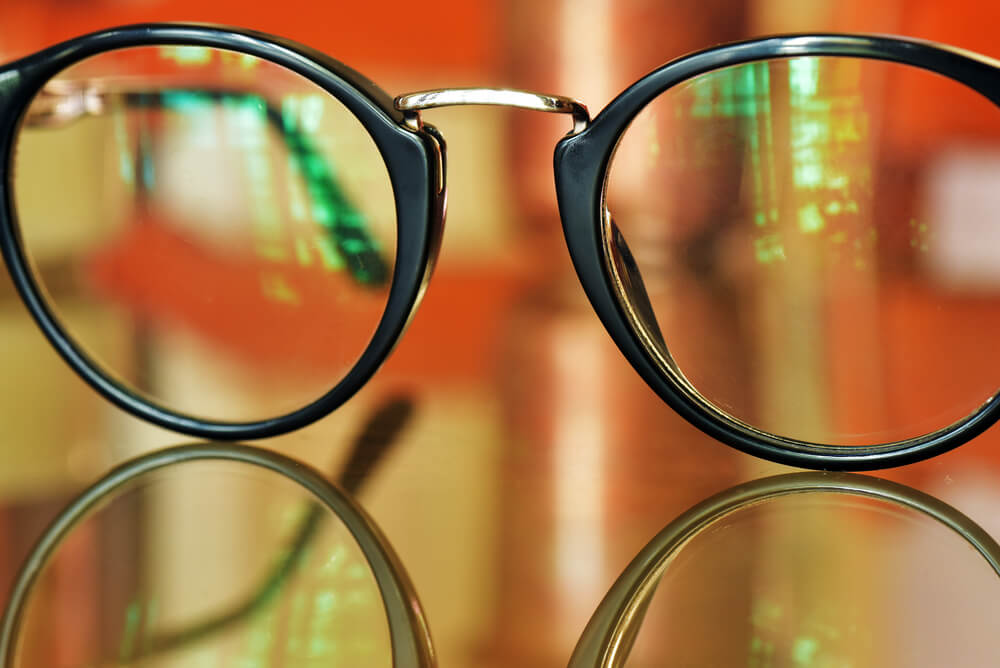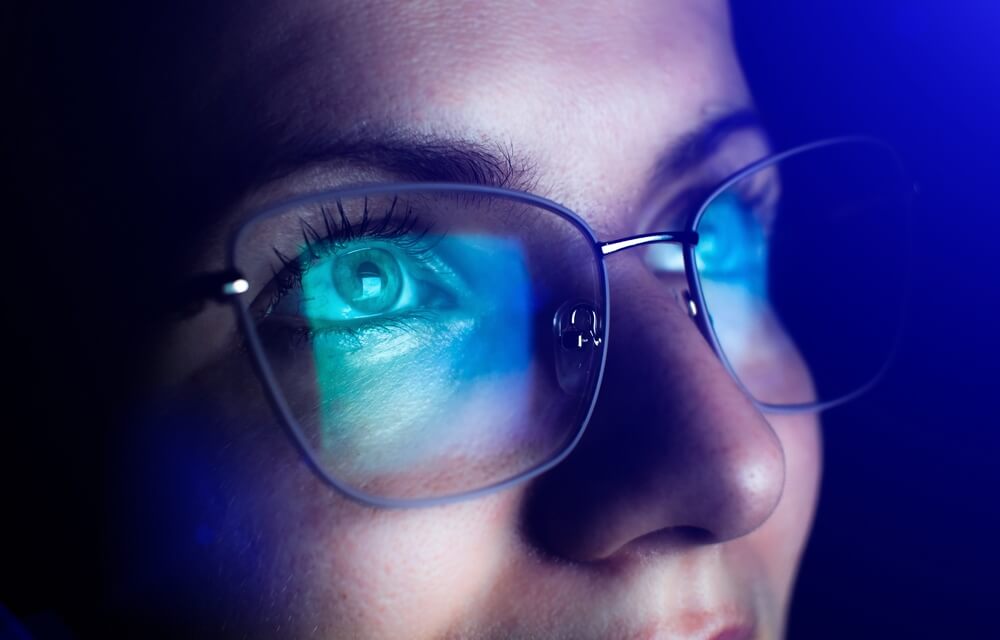Anyone who wears glasses knows that when it comes to purchasing a new pair, dozens of lens options are available. Besides picking the frames and getting your prescription, you need to choose lenses that are suitable material for you. You can pick glass or plastic, but there’s more than that to think about.
Anti-reflective lenses or anti-glare lenses are becoming increasingly popular. They’re great for decreasing the reflective light in your eyes and allow you to see better without light impairing your vision. No one wants to wear corrective lenses that make seeing even more difficult than it is without them. Let’s dive into what anti-reflective coating is on glasses and how this technology works well.
What Is Anti-Reflective Coating?

Anti-reflective (AR) lenses and anti-glare (AG) are specific coatings that your glasses can have. They help to decrease the reflective light in your lenses and, therefore, your eyes. Manufacturers can apply anti-reflective lenses to the front, back, or both sides of your lenses to help control the light that gets into your eyes.
The science behind these lenses is to help limit the amount of light that passes through your lenses to your eyes. When too much light enters your eyes, it can decrease your vision. So, using an anti-reflective coating can help increase your vision. Anti-reflective glasses temper glare from bright lights or mitigate the effects of computer vision syndrome.
There are two layers to an AR coating on glasses, the anti-reflective layer and the scratch-resistant layer. Both work together to decrease the amount of light entering your eyes.
How Does Anti-Reflective Coating Work?
Anti-reflective coating is made by using several layers of metal oxides. Manufacturers will apply them to the surface of your anti-reflective glasses or another lens. Yes, an anti-reflective coating isn’t just for anti-glare glasses. You can use this coating on cameras, microscopes, and telescopes too. The layers of metal oxides help limit the light that reflects onto your lenses and will help keep your vision intact versus preventing you from seeing well.
The Benefits of Anti-Reflective Coating
Not all glasses come with an anti-reflective coating on them. So, why should you consider getting a pair of anti-reflective glasses? There are several benefits to wearing glasses with an anti-reflective coating.
One of the main benefits is that your vision will improve. While it can’t change your prescription, it will allow you to see better when you’re wearing the anti-glare glasses. Since you don’t have to worry as much about light shining as brightly into your eyes from the glare of the glasses, you will be able to see more. You’ll be able to see everything in front of you more clearly.
When there are fewer reflections on your glasses, the light will pass through your lenses and optimize your visual acuity rather than entering your eyes. You’ll hardly notice the lights hitting your lenses. You’ll also be able to make better eye contact with the people you’re talking to!
Since you won’t have to work as hard to see things at night or in a brightly lit area, anti-reflective glasses can reduce eye strain and eye fatigue. Anti-reflective coating is especially great for high-index glasses lenses rather than plastic lenses.
Regular plastic lenses reflect about 8% of light, while high-index lenses can reflect up to 50% more. Modern AR coating allows 99.5% of light to enter the vision and enables you to see better. Anti-glare glasses might be your best line of defense against blue light effects on your eyes.
When more light enters your eyes rather than reflecting off your glasses, people can see you better, and you can see them better, which will make for better conversation. Having anti-reflective glasses tends to look nicer too, and you’ll be able to look your absolute best no matter the lighting conditions.
If you’re using photochromic lenses, an anti-reflective coating can help enhance the comfort and clarity of your lenses. The best part is that even though it improves your sight in all light conditions, it won’t reduce the sun-reactive properties.
You can also use an anti-reflective coating on sunglasses! The benefits of this are that the coating can eliminate any glare from the sun reflecting into your eyes on the back surface of your tinted lenses. Unlike traditional eyeglasses, an anti-reflective coating is only applied to the back surface rather than the front or both the front and back.
Cleaning your anti-glare glasses or sunglasses isn’t too challenging, but you need to be careful not to scratch the lenses. Surprisingly, modern anti-reflective coating is durable and makes glasses or sunglasses easier to clean and maintain than lenses without layers.
The anti-reflective coating has a surface treatment that seals the layers together, making cleaning more manageable and less stressful. The surface is hydrophobic, meaning it repels water and prevents water spots from forming on the lenses of your anti-glare glasses or sunglasses.
Some AR lenses are oleophobic in addition to being hydrophobic. With this, they can repel water and oils.
Choosing Anti-Reflective Coating for Your Eyeglasses
Each company that makes anti-reflective lenses uses its own unique formula to create the coating. Even still, most anti-reflective coatings generally have the same base. They are all made with microscopic metallic oxide layers. They alternate between high and low refraction indexes.
The layers in the coating all affect different wavelengths of light. Therefore, the more layers a lens has, the more reflections it will be able to neutralize. Most anti-reflective glasses only have two or three layers, but some can have up to seven.
Your optician can suggest a specific glasses brand with one anti-reflective coating depending on your needs. If you work on a computer all day, glasses with an anti-reflective coating that filters blue light are a great option. There are also anti-reflective coatings that can’t filter blue or green light.
You’ll also want to think about the durability of your lenses. If you wear them all the time, you risk dropping or damaging them, so you need a more durable lens to prevent breaking or scratches. The good thing is that most anti-reflective coating is naturally durable.
When choosing the suitable anti-reflective coating for your glasses, you’ll also want to decide if you’re going to get a pair of sunglasses with this coating too. If you like the coating for your standard anti-glare glasses, you’ll probably appreciate them if you wear them often.
If you can’t decide which anti-reflective coating is the right one for you, be sure to talk with your eye doctor. They should be able to provide you with options that best suit your lifestyle and will work the best for you.
Why You Need Anti-Reflective Coating for Your Glasses

Anti-reflective coatings are a great option to consider when choosing a new pair of glasses or another optical device. They help limit the amount of glare that hits your lenses which can impair your vision.
The last thing you want is there to be a massive glare on your lenses when driving because it can cause an accident or during a huge presentation at work because people can’t see your eyes when you’re speaking.
Anti-reflective coating on glasses is the solution to all your glare problems, and your optometrist can help you choose the perfect pair that will help improve your vision.
If you’re interested in a pair of anti-glare glasses or sunglasses, contact Art of Optiks today to schedule an exam.

